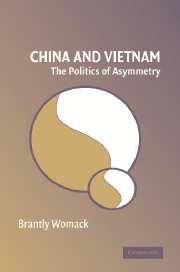Book contents
- Frontmatter
- Contents
- Tables, Figures, and Maps
- Preface
- Introduction
- 1 General Overview
- PART ONE BASIC STRUCTURE
- PART TWO THE RELATIONAL DYNAMIC
- 5 From the Beginnings to Vietnamese Independence
- 6 Unequal Empires
- 7 The Brotherhood of Oppression: 1840–1950
- 8 Lips and Teeth: 1950–1975
- 9 Illusions of Victory: 1975–1991
- 10 From Normalization to Normalcy
- 11 Change and Structure in Asymmetry
- Appendix: Glossary of Terms
- Bibliography
- Index
6 - Unequal Empires
Published online by Cambridge University Press: 02 December 2009
- Frontmatter
- Contents
- Tables, Figures, and Maps
- Preface
- Introduction
- 1 General Overview
- PART ONE BASIC STRUCTURE
- PART TWO THE RELATIONAL DYNAMIC
- 5 From the Beginnings to Vietnamese Independence
- 6 Unequal Empires
- 7 The Brotherhood of Oppression: 1840–1950
- 8 Lips and Teeth: 1950–1975
- 9 Illusions of Victory: 1975–1991
- 10 From Normalization to Normalcy
- 11 Change and Structure in Asymmetry
- Appendix: Glossary of Terms
- Bibliography
- Index
Summary
With the declaration of the Empire of Dai Co Viet by Dinh Bo Linh (Dinh Tien Hoang) in 968, and especially with the Song Dynasty's recognition of Dinh as King of Giaozhi in 975, contact between China and Vietnam entered the realm of international relations.
But relations between China and Vietnam over the next thousand years do not fit the stereotypes of contemporary thinking about international relations. Nations are often imagined to be sovereign units confronting one another like knights on a field of battle. First, they are assumed to be unitary actors, usually personified by the leader or the capital city – “Beijing thinks this … Hanoi does that.” Second, the internal structure, identity, and values of each presumably are not influenced by the others. Like balls colliding on a pool table, states remain unaffected by the other states they strike, except that their trajectory will change and they may be destroyed by the collision. Third, it is axiomatic that states will contend for power, because if one state is clearly stronger than another, it will dominate the weaker one. If a state is vulnerable to a stronger adversary, it will either collude with other states in order to balance the adversary's advantage, or it will submit.
Each of these three expectations is well grounded in the essential characteristics of sovereignty as it has been understood in the West since Machiavelli. The minimum condition for the existence of a state is that it controls territory.
- Type
- Chapter
- Information
- China and VietnamThe Politics of Asymmetry, pp. 117 - 141Publisher: Cambridge University PressPrint publication year: 2006



